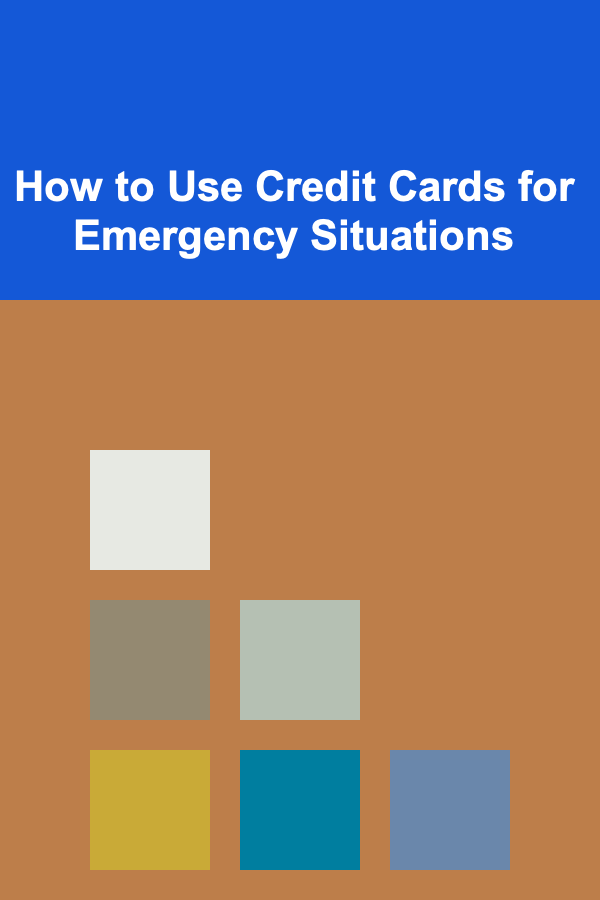
How to Use Credit Cards for Emergency Situations
ebook include PDF & Audio bundle (Micro Guide)
$12.99$7.99
Limited Time Offer! Order within the next:

Credit cards are a common financial tool that many people use daily for their convenience, rewards, and security. However, in certain situations, they can also be lifesavers during emergencies. Whether it's a medical emergency, urgent home repairs, or an unexpected job loss, a credit card can provide immediate financial relief. Yet, like any tool, using it improperly or without understanding the risks can lead to financial trouble.
This article explores how to effectively and safely use credit cards in emergency situations. It will guide you through understanding your credit card's benefits, when to use a credit card for emergencies, how to manage payments, and how to avoid common pitfalls associated with credit card debt.
Understanding Credit Cards and Emergencies
A credit card functions as a short-term loan, allowing you to make purchases and pay them off later, typically with interest. It offers flexibility in handling unexpected costs without requiring you to have the full amount available in your checking account at the time. However, credit cards come with certain risks, such as high-interest rates and fees for missed payments, making it important to use them wisely, especially during emergencies.
An emergency is generally defined as an unexpected situation that requires immediate financial attention. These situations often come with a time constraint, meaning you might not have the luxury to shop around for the best deal or savings options. Credit cards, if used correctly, provide the flexibility to address urgent needs right away while you work on a longer-term solution.
Types of Emergencies That May Require Credit Card Use
Emergencies are, by nature, unforeseen, and they can take various forms. Below are some of the most common emergencies where credit cards may come in handy:
1. Medical Emergencies
Unexpected medical expenses, whether due to an accident, sudden illness, or ongoing treatment, can create financial pressure. While health insurance may cover part of the costs, deductibles, copayments, and uncovered treatments can lead to significant out-of-pocket expenses. In these instances, credit cards can provide the funds needed to cover costs temporarily.
2. Car Repairs and Breakdown
Car repairs can be expensive, especially if the damage occurs suddenly. Whether your car breaks down while you're on a road trip or it needs major repairs to stay functional, a credit card can help you cover the costs if your savings aren't sufficient. Immediate repairs may be necessary to ensure you have transportation to work or other essential activities.
3. Home Repairs
From broken water pipes to roof leaks, home repairs often cannot be delayed. If you don't have an emergency fund specifically for home maintenance, a credit card can offer quick financing. It's important to consider, however, the long-term implications of using a credit card for home repairs due to the potential for high-interest payments if the balance is not cleared promptly.
4. Job Loss or Income Disruption
In cases where your income is interrupted, whether due to job loss, a personal crisis, or a reduction in hours, credit cards can serve as a temporary solution to help cover your living expenses. Using credit cards to bridge the gap between income and expenses can buy you time while you find new employment or adjust to the change in circumstances.
5. Travel Emergencies
Unforeseen travel expenses, such as last-minute flights, accommodation, or cancellations, are another situation where credit cards can be incredibly helpful. Emergency situations, such as missing a flight, needing medical attention abroad, or having to extend a trip unexpectedly, often require fast access to funds, and credit cards can help with this.
Benefits of Using Credit Cards for Emergencies
Using a credit card during an emergency offers several advantages that can provide peace of mind and security during stressful times.
1. Immediate Access to Funds
One of the most significant benefits of using a credit card in emergencies is the immediate access to funds. Unlike loans or lines of credit that might require an application and approval process, a credit card is already available, and most credit cardholders can access a significant line of credit. This makes it a reliable option when time is of the essence.
2. Protection and Security
Credit cards often come with fraud protection, meaning if your card is stolen or used fraudulently, you're not liable for the charges. This offers a sense of security in emergencies when you may be using your card in unfamiliar or high-risk environments.
3. Reward Points and Benefits
Many credit cards offer rewards such as cashback, points, or miles for purchases. While it's essential to prioritize your financial situation over rewards, using your card during emergencies may help you accumulate points or cashback that can be redeemed for future use, potentially offsetting some of your costs.
4. Grace Periods
Credit cards often come with a grace period, typically 21 to 30 days, during which no interest is charged on new purchases if the balance is paid off in full. If you can pay off your credit card balance before the due date, you can use the card for emergencies without incurring interest costs, which is a significant advantage.
5. Ability to Make Partial Payments
Unlike personal loans, which often require a lump sum payment, credit cards allow you to make partial payments, providing flexibility. This can be particularly helpful if you cannot pay off the entire balance at once but want to reduce your financial burden over time.
When to Use a Credit Card for Emergencies
While credit cards can be a useful financial tool during emergencies, they should not be relied upon for every situation. Here's when it makes sense to use a credit card for emergencies:
1. You Have a Clear Plan to Pay Off the Balance
The key to using a credit card responsibly is ensuring you have a clear plan to pay off the balance. If you're confident that you can pay off the debt within a reasonable timeframe---ideally before interest begins accruing---then a credit card can be a useful emergency tool.
2. The Emergency is Time-Sensitive
Emergencies often require quick action. Whether you need medical attention, a car repair, or emergency travel arrangements, credit cards provide instant access to funds, allowing you to respond quickly to the situation without waiting for a loan or other financing options.
3. You Have No Other Financial Options
If you don't have an emergency savings fund or access to other forms of credit, a credit card may be your only option to address an urgent need. However, it's important to ensure you are using the card responsibly and have a plan to manage the debt afterward.
4. The Cost is Manageable
For smaller emergencies, credit cards are a convenient way to cover immediate costs. For larger financial emergencies, such as medical bills or major home repairs, it may make more sense to explore other financing options, such as personal loans or negotiating payment plans with service providers.
How to Manage Credit Card Debt After an Emergency
While credit cards can be incredibly useful in emergencies, failing to manage the resulting debt can lead to long-term financial stress. Here are steps to help you manage credit card debt after an emergency:
1. Prioritize Payments
If you have multiple credit card balances, prioritize paying off the card with the highest interest rate first. Once that balance is cleared, move on to the next highest interest card. This approach minimizes the overall interest you'll pay.
2. Avoid Using Your Card for Non-Essential Purchases
After using your card for an emergency, resist the temptation to make non-essential purchases. Using credit cards for everyday spending can escalate your debt and make it harder to pay down the emergency balance.
3. Set Up a Payment Plan
If you're unable to pay off the full balance immediately, set up a payment plan with your credit card issuer. Some companies offer zero-interest payment plans or balance transfers to help manage debt more effectively. Look for promotional interest rates and avoid transferring balances to a new card with a high interest rate.
4. Consider Refinancing or Consolidation
If the debt is substantial, you may want to consider consolidating your credit card debt into a personal loan with a lower interest rate or applying for a 0% balance transfer card. These options can help you pay off debt faster and save on interest.
5. Build an Emergency Fund for the Future
One of the most proactive steps you can take after using a credit card in an emergency is to start building an emergency fund. Aim for at least three to six months' worth of living expenses, which can help you avoid relying on credit cards for future emergencies.
Risks of Using Credit Cards in Emergencies
While credit cards can be a useful tool in emergencies, they come with risks, particularly if not used responsibly. Here are some of the risks to be aware of:
1. High-Interest Rates
Credit card interest rates can be very high, often upwards of 20% APR. If you can't pay off your balance quickly, interest charges can quickly compound, making the cost of the emergency far greater than expected.
2. Debt Spiral
If you're not careful, using credit cards in emergencies can lead to a cycle of debt. If you continue to rely on credit cards to cover unexpected costs, your balances can accumulate quickly, making it harder to break free from debt.
3. Damage to Credit Score
Accumulating a large credit card balance and missing payments can hurt your credit score. This can make it more difficult to obtain favorable financing in the future and may lead to higher interest rates on other loans or credit cards.
4. Fees and Penalties
Late payments, over-limit fees, and foreign transaction fees can add up quickly. Be sure to read your credit card terms and conditions to avoid unnecessary fees.
Conclusion
Credit cards can be an invaluable tool in emergency situations, offering immediate access to funds, flexibility, and security when you need it most. However, to avoid falling into debt, it's essential to use credit cards responsibly, manage payments effectively, and ensure that you have a plan for repaying your balance. By understanding when and how to use a credit card for emergencies, and by taking proactive steps to manage debt afterward, you can navigate financial crises without jeopardizing your long-term financial health.

Beginner Guide: The Guide to Effective Communication
Read More
How to Find a Kiplinger Financial Advisor to Optimize Your Financial Strategy
Read More
How to Make Money as a Paid Proofreader
Read More
How to Make Money Online as a LinkedIn Profile Writer: 10 Actionable Ideas
Read More
How to Schedule Regular Pest Control Inspections
Read More
Secrets to Affordable Beauty and Skincare: Looking Fabulous Without the Price Tag
Read MoreOther Products

Beginner Guide: The Guide to Effective Communication
Read More
How to Find a Kiplinger Financial Advisor to Optimize Your Financial Strategy
Read More
How to Make Money as a Paid Proofreader
Read More
How to Make Money Online as a LinkedIn Profile Writer: 10 Actionable Ideas
Read More
How to Schedule Regular Pest Control Inspections
Read More